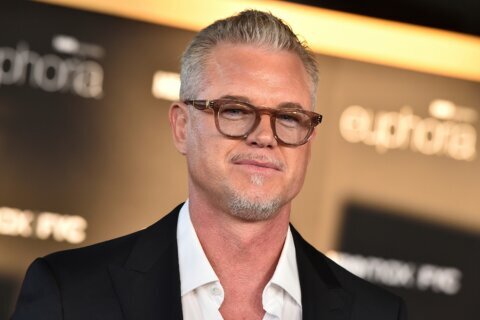If you remove perennial favorites from Shakespeare and Dickens, what is America’s most produced play of the 2018-2019 season, according to American Theatre magazine?
It’s “A Doll’s House, Part 2” by Round House Theatre at the Lansburg Theatre until June 30.
“You don’t have to have seen Part 1 to enjoy this certainly, but I do think the source material has left such an impact on theater audiences since it was written,” actress Kathryn Tkel told WTOP. “Naturally, because this play deals with what has happened since … I think people are really curious. Everyone who sees this play is going to have some skin in the game because it’s really about relationships. There’s no way to watch this story and not have an opinion.”
Based on Henrik Ibsen’s Norwegian classic from 1879, playwright Lucas Hnath penned a sequel set 15 years after Nora Helmer left her husband Torvald with the slam of a door.
“It ends with this woman leaving her marriage, leaving her children, leaving for her own personal reasons,” Tkel said. “Especially at the time, it was such a massive shock for people that it really did reverberate in literature and audiences over time. It took until now for somebody like Lucas to say, ‘What do we all think happened to Nora?’ then investigate that.”
That investigation plays out through a series of tough conversation in Part 2.
“[Part 1] ends with the slamming of a door; our play opens with a knocking on the door,” Tkel said. “[Nanny] Anne Marie answers the door and they have a conversation. Torvald makes his way back into the space, and he and Nora have a conversation. All three of these characters were present in the first telling and they remember the events in a particular way. … They also have their own opinions about what happened after she left. … This is the aftermath.”
Nora is played by theatrical force of nature Holly Twyford (“Who’s Afraid of Virginia Woolf?”).
“I am so happy to be invited to this party [and] one of the reasons is Holly,” Tkel said. “People really know her work, and she is really part of the fabric of this community. … She is so smart, authentic, dynamic, strong, charismatic, all the things you want from a stage performer. I was very excited to find out we were going to be working together. I was also certainly intimidated … but she couldn’t be a more warm, funny, down-to-earth, just great scene partner.”
Torvald is played by local favorite Craig Wallace (“Death of a Salesman,” “A Christmas Carol”).
“[He’s] so talented, so smart, such a presence, such a force to behold on stage that to see him cast to investigate the lover — who was left and felt that he did all he could, who was living one particular life, felt like it was a good life and then have it implode at the end — to have Craig Wallace bring Torvald back to life is a real gift for audiences,” Tkel said. “To watch him come with his whole heart and to know that him and Holly have known each other for years, to draw on their natural chemistry … was really a wonder to behold. We’re really lucky.”
Rounding out her co-stars is Nancy Robinette (“The Heiress”) as former nanny Anne Marie.
“I was always so taken by the life that she creates on stage without saying a word,” Tkel said. “When she starts speaking, it’s even better, but she just brings everything into the space … to charge the space. That’s something she does naturally and I think that’s something you can’t always name with great actors, but you see them working. … You go with them, you believe them, there’s a whole life and a fully-fledged person on stage. That’s how I feel about Nancy.”
Tkel herself plays daughter Emmy, who was briefly mentioned but unseen in the original.
“Emmy comes in quite far into our play because Nora needs something,” Tkel said. “Because she was so young in the first play, she has two older brothers who remember Nora but she does not. She knows other people’s opinions about her mother and what has been said about her mother, but she didn’t have a way to form her own opinions that first go round, so this is really the first meeting between these two women, which is fodder for all kinds of stuff.”
Orchestrating it all is Nicole A. Watson, who has served as the associate artistic director at Round House but now gets to officially step into the directing chair for the first time here.
“I couldn’t be more lucky to have Nicole Watson at the helm of all of us,” Tkel said. “She is such a great supporter and a proponent of us investigating as deeply as we could. As she said one day, ‘This play, to decide what our version of it is … we really have to go wide and deep and investigate any number of options.’ She was really there for that. It was so stabilizing and grounding to have the person captaining the ship say, ‘That’s how I feel about it, I’m watching you guys work and it’s OK that you’re still discovering because that’s what this play is.'”
With scenic designer Paige Hathaway on board, it’s a period space circa turn-of-the-century.
“It’s a room in the house that is not really used that much anymore,” Tkel said. “It’s quite a big room with empty frames, chairs, a couple of pieces of furniture that are no longer of daily use. … The idea being that it’s really a space where ideas can really thrive. Though it’s in Torvald and Anne Marie’s home, it’s not a place that is all Team Torvald, it’s a place where Nora used to be, so she remembers things being there that are no longer there. … It is both different and the same in the way that when you come back to a place after being gone for many years.”
Despite it being a period piece, Tkel insists the production is lively.
“I forget that it’s not 2019 at times because the language is so visceral,” Tkel said. “We have this idea that when something is a period piece, we think we aren’t going to relate to it … but this play really straddles the line between contemporary and 1879. It is both talking about conventions of that time and also talking about the way we feel about the conventions from a contemporary lens. … That produces a real impact, which is funny, shocking and exhilarating.”
Find more details on the theater website. Hear our full conversation with Kathryn Tkel below:







